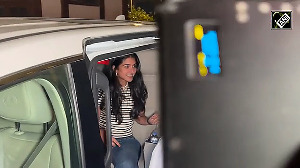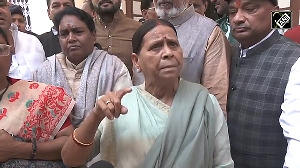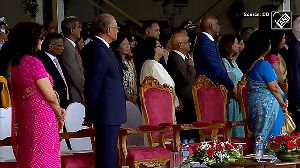Against the backdrop of Bollywood actor Shahrukh Khan's detention at a New York airport, the United States has ruled out any special screening for VIPs and celebrities unless they have diplomatic exemption, but said it is in talks with several countries to facilitate hassle-free immigration procedures.
India is not among those countries with which the US is having such negotiations.
But, announcement in this regard with South Korea is expected soon, custom officials said on Thursday.
"I'm not aware of anything right now," John Wagner, Executive Director of Admissibility and Passenger Programmes with the US Customs and Border Protection, told foreign journalists when asked if the US was holding any talks with India to facilitate quick and hassle-free immigration procedures for people coming from India.
However, US citizens and those holding permanent residency can apply under the "Global Entry" programme, under which once cleared by the federal authorities, an individual would not have to go through the immigration officer, but would have to use the services of a touch-screen kiosk to enter the country.
"As far as any other, say, process for VIP arrivals, unless they have some type of, say, diplomatic visa or exemption, everyone would go through the same type of process. We don't want it to be seen as a hassle," Wagner said in response to a question.
"We want people to understand the importance of it, and we are keeping people safe, and it's -- we want people to have the confidence that it's safe and secure to come here, and part of those processes is (to) ensure that. So we do ask for the public's patience in helping us help them and make sure all those requirements are met," he said when his attention was drawn to the inconvenience caused to VIPs and celebrities at airports in the US.
Right now, Wagner said, the US is in discussions with a lot of different governments.
"It works on a reciprocal basis and some level of agreement on a level of background checks each country will do. So it's a matter of whether we can reach agreement with those countries and they're willing and able to do types of checks, and we can negotiate a threshold for qualifying our participation in that," he said.
His comments came nearly two months after actor Shah Rukh Khan was detained at a New York airport for over two hours by immigration officials after he arrived from India in a private plane to address students at Yale University.
Later, US authorities expressed "profound" apology in a letter to the Indian mission in US on the April 13 incident.
Former President AP J Abdul Kalam was twice subjected to frisking at New York's JFK Airport by US security officials who even took his jacket and shoes to check for explosives.
India's former ambassador to the US Meera Shanker was pulled from an airport security line and patted down by a security agent in Mississippi in December 2010.
Wagner said so far about 340,000 people enrolled in the Global Entry programme.
"But what's great about it, once you get approved and when you come off the plane, you do not get in the regular line for passport control," he said.
"You go right to a kiosk where it will read your passport, it will read your fingerprints and confirm you're the same person we enrolled. You'll then answer your customs declaration questions via touch screen so you don't have to fill out the form on the plane any longer. We'll do the same series of background checks as if an officer had read your passport personally, and then if all goes well it will print out a receipt, you'll claim your baggage and then hand the receipt at the egress check to depart from our facility," the officer said.
The goal is really to get as many low-risk travellers from as many countries as the US can into the programme and using this automated process, he said.
"Every time someone uses the kiosk, it saves us one to three minutes of officer time, so we look it as a security benefit of having the ability, really, to facilitate identified low-risk travellers through this process, save time on their end and save resources on our end, so we can redirect those resources to processing everyone else," he said.








 © 2025
© 2025